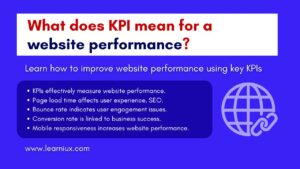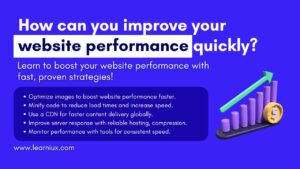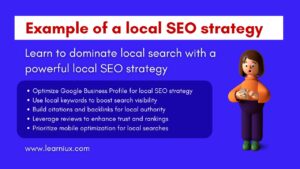Introduction
Local SEO is a specialized approach to search engine optimization that helps businesses attract customers from their surrounding geographic area. Unlike traditional SEO, which focuses on broad visibility, local SEO focuses on location-based searches to increase foot traffic, phone calls, and sales for businesses like restaurants, retail stores, or service providers. For example, when someone searches for “coffee shop near me” or “best plumber in Mumbai,” local SEO ensures that your business appears prominently in the results, whether on Google Maps or in organic search listings.
In this comprehensive guide, we’ll walk you through a step-by-step process to master local SEO for your business. From setting up your Google Business Profile to creating hyper-local content, these strategies are designed to increase your visibility and connect you with customers nearby. Whether you’re a small business owner or a marketer, implementing effective local SEO can make a significant difference in your growth. Let’s dive into actionable steps to optimize your online presence and dominate local search results.
Understanding the Basics of Local SEO
Local SEO is about making your business discoverable when people search for products or services in your area. It’s a subset of SEO that prioritizes geographic relevance, ensuring your business ranks high in searches with local intent. For example, a user searching for “dentist in Delhi” is likely looking for a nearby provider, and local SEO helps your business appear in those results.
The importance of local SEO lies in its ability to connect businesses with high-intent customers who are ready to make a purchase or visit a store. Studies show that more than 80% of local searches on mobile devices result in conversions such as calls or in-store visits. By optimizing for local SEO, you increase your chances of appearing in the coveted “local pack” of the top three business listings shown in Google’s Maps results.
Local SEO differs from traditional SEO in that it focuses on location signals. While traditional SEO may target broad keywords like “best running shoes,” local SEO includes modifiers like “best running shoes in Bangalore.” It also relies heavily on tools like Google Business Profiles, online reviews, and local citations to establish trust and relevance. Understanding these basics sets the stage for the next practical steps to take.
Claim and Optimize Your Google Business Profile
Your Google Business Profile (GBP) is the cornerstone of local SEO. It’s a free tool provided by Google that allows you to manage how your business appears in search results and maps. A well-optimized GBP increases your visibility, provides essential information to customers, and signals to Google that your business is active and trustworthy.
To get started, visit Google’s platform and claim your business. If it’s already listed, verify ownership with a phone call, email, or postcard sent to your business address. Once claimed, fill out each section of your profile with accurate details, including your business name, address, phone number (NAP), and business hours. Consistency in these details is important, as inconsistencies can hurt your local SEO rankings.
Next, enhance your profile with high-quality photos of your storefront, products, or team to make it visually appealing. Add a detailed business description that naturally includes local SEO keywords like “best bakery in Pune” or “trusted electrician in Chennai.” Update your profile regularly with posts about promotions, events, or new services to keep it fresh. These updates let Google know that your business is connected to its audience, which boosts your local SEO performance.
Enable features like messaging or booking options to make it easier for customers to connect with you. A fully optimized GBP not only increases your chances of ranking among the local pack, but also builds trust with potential customers searching for local businesses.
Do local keyword research
Keyword research is an important component of local SEO, as it helps you identify the words your target audience uses when searching for businesses in your area. Unlike broad SEO keywords, local SEO keywords often have geographic modifiers, such as “near me,” “in [city],” or “best [service] in [location].” For example, a gym in Hyderabad might target “fitness classes in Hyderabad” or “personal trainers near me.”
Start by using free or affordable tools like Google Keyword Planner, Ubersuggest, or AnswerPublic to find relevant keywords. Enter your service or product along with your location to generate a list of search terms. Focus on long-tail keywords (phrases with three or more words) as they are less competitive and match specific user intent. For example, “affordable pizza delivery in Kolkata” is more targeted than “pizza delivery.”
Analyze your competitors’ websites to see which local SEO keywords they rank for. Tools like SEMrush or Ahrefs can provide insight, but even a manual search for your service in your area can reveal which terms top-ranking businesses in your area use. Once you have a list, prioritize keywords with good search volume and low competition, then integrate them naturally into your website, GBP, and other online content.
Keep user intent in mind when choosing keywords. For example, someone searching for “emergency plumber in Mumbai” is ready to hire, so targeting such high-intent terms can yield immediate results. Revise your keyword strategy regularly to stay in line with changing search trends and improve your local SEO results.
Optimize Your Website for Local SEO
Your website is a powerful tool for local SEO, serving as a hub for search engines and customers to learn about your business. A well-optimized site strengthens your position, showcases your services, and increases your chances of ranking high in local search results.
If you serve multiple areas, start by creating location-specific pages. For example, a landscaping company in Delhi might have separate pages for “Landscaping Services in South Delhi” and “Landscaping Services in Gurgaon.” Each page should have unique, high-quality content that includes local SEO keywords for the specific area, contact details, and embedded maps. Avoid duplicating content across pages, as this can confuse search engines and hurt your rankings.
Implement schema markup, also known as structured data, to help search engines understand your business details. Use tools like Google’s Structured Data Markup Helper to add schema for your business name, address, phone number, and hours. This can lead to rich snippets in search results, such as star ratings or map displays, which can increase your local SEO visibility.
Make sure your website is mobile-friendly, as most local searches occur on smartphones. Use Google’s mobile-friendly test to test your site’s responsiveness and optimize loading speed to improve user experience and rankings. Include clear calls-to-action like “Call Now” or “Get Directions” to encourage conversions from local visitors.
Embed Google Maps on your contact page and make sure your NAP details accurately match your GBP. Consistent information on your website and other platforms strengthens your local SEO signal, making it easier for search engines to trust and rank your business.
Manage and Encourage Reviews for Local SEO
Online reviews are a key ranking factor in local SEO, influencing both search engine algorithms and customer trust. Positive reviews show Google that your business is reputable, and they can convince potential customers to choose you over your competitors.
To collect reviews, make it easy for satisfied customers to leave feedback. After completing a service or sale, send a polite email or text with a direct link to your Google Business Profile reviews section. You can also use QR codes on receipts or in-store signage to encourage reviews. Avoid encouraging reviews, as this violates Google’s guidelines and can lead to penalties.
Respond promptly and professionally to all reviews (positive and negative). Thank customers for positive feedback to show appreciation, and calmly address negative reviews to show your commitment to customer satisfaction. Participating in reviews not only improves your local SEO, but also builds a positive brand image.
Encourage reviews on other platforms, such as Yelp or industry-specific directories, but prioritize Google, as it carries the most weight for local SEO. Monitor your reviews regularly using tools like Google Alerts or review management software to gain feedback and maintain a strong online reputation.
Build Consistent Citations and Backlinks
Citations and backlinks are essential to establishing your business’s credibility and authority in local SEO. A citation is any online mention of your business’s NAP details, while a backlink is a link from another website to your website. Both help search engines verify the legitimacy and relevance of your business.
Start by auditing your existing citations using tools like Moz Local or BrightLocal to ensure consistency across directories like Yellow Pages, JustDial, or Sulekha. Inconsistent NAP details can confuse search engines and hurt your local SEO rankings, so fix the discrepancies immediately. Submit your business to reputable local directories, making sure your information is accurate and complete.
To build backlinks, focus on local opportunities. Partner with nearby businesses, sponsor community events, or contribute guest posts to local blogs or news sites. For example, a restaurant in Ahmedabad could sponsor a local food festival and get a link from the event’s website. These local backlinks are very important in local SEO, as they show that you are relevant to your area.
Avoid low-quality or spammy directories, as they can hurt your rankings. Instead, prioritize authoritative platforms and work consistently to build citations and backlinks over time. This consistent approach strengthens your local SEO foundation and improves your visibility.
Create local content and engage on social media
Content tailored to your local audience is a powerful way to boost local SEO while attracting potential customers. By creating relevant, location-specific content, you establish your business as a trusted resource in your community.
Start a blog on your website and write about topics that your local audience will be interested in. For example, a real estate agency in Bengaluru could publish posts like “Top Neighborhoods to Buy a House in Bengaluru” or “Guide to Renting in Koramangala.” Include local SEO keywords naturally and include references to local landmarks, events, or news to make the content relevant.
Engage your audience on social media platforms like Instagram, Facebook, or Twitter by sharing updates about your business, local events, or customer stories. Post photos of your team participating in community activities or highlight customer testimonials to build trust. Use location-based hashtags like #MumbaiEats or #ChennaiFitness to increase discoverability and support your local SEO efforts.
Promote user-generated content by asking customers to share photos or tag your business in their posts. This not only increases engagement, but also creates additional signals that search engines associate with local relevance. By combining local content with an active social media presence, you increase your local SEO impact.
Monitor and analyze your local SEO performance
Tracking your local SEO performance is important to understand what’s working and where you need to improve. By analyzing key metrics, you can refine your strategy and stay competitive in local search results.
Use tools like Google Analytics and Google Search Console to monitor website traffic, click-through rates, and keyword rankings. In particular, track how many visitors come from local searches and which pages drive the most engagement. Google Business Profile Insights also provides valuable data on how customers find your profile, such as through search or maps, and it also provides valuable data on actions like calling or visiting your website.
Set up rank-tracking tools like Moz or SEMrush to monitor your position for targeted local SEO keywords. For example, check if you’re ranking in the top three for “best coffee shop in Jaipur” or “car repair near me.” Review this data regularly to identify trends, such as seasonal fluctuations or keyword opportunities.
Based on your findings, adjust your local SEO strategy. If certain keywords aren’t performing well, improve your content or target new terms. If your GBP isn’t getting enough clicks, experiment with new photos or posts. Continuous monitoring and optimization ensure that your local SEO efforts remain effective and aligned with your business goals.
Advanced Tips for Mastering Local SEO
To stay ahead of local SEO, consider advanced strategies that align with emerging trends and technologies. One key area is voice search optimization, as more users rely on devices like Google Assistant or Alexa for local queries. Focus on conversational, long-tail keywords like “where can I find a good tailor in Hyderabad” to capture these searches. Crafting your content in a question-and-answer format can also increase your chances of appearing in voice search results.
Another advanced tactic is to use AI-powered insights to predict customer needs. Tools like Google Trends or social listening platforms can help you identify rising local search terms or topics relevant to your audience. For example, a pet store in Pune might notice increased searches for “pet boarding near me” and create targeted content to meet this demand.
Stay up to date on local SEO algorithm changes by following industry blogs, attending webinars, or joining online communities. Google updates its ranking factors frequently, so staying informed can help you adapt quickly. For example, there has been a recent emphasis on user experience signals like page speed and mobile usability, which means prioritizing technical SEO alongside local optimization.
Consider trying paid local advertising, such as Google Ads with Location Extensions, to supplement your organic local SEO efforts. These ads can increase visibility for competitive keywords and drive immediate traffic while you build your organic rankings.
Conclusion
Local SEO is a dynamic and essential strategy for any business looking to attract and grow their local customers. By claiming and optimizing your Google Business Profile, conducting in-depth keyword research, and building a strong online presence, you lay the foundation for success. Supplementing your efforts with local content, reviews, citations, and performance tracking ensures long-term results.
Start implementing these steps today to see measurable improvements in your local SEO rankings. Whether you’re a small business or a multi-location operation, a focused local SEO strategy can drive more traffic, leads, and sales from your community. Be consistent, monitor your progress, and adapt to changes to help your business thrive in local search results.
FAQs
What is local SEO and why is it important for my business?
Local SEO is a strategy that optimizes a business’s online presence to attract customers in a specific geographic area. It focuses on appearing in location-based searches, such as “cafes in Mumbai” or “dentist near me,” to increase foot traffic and leads. By prioritizing local SEO, businesses increase their visibility in Google’s local packs and maps, which are crucial for capturing high-intent customers. Studies show that most local searches on mobile devices lead to conversions, such as store visits or calls. A strong local SEO strategy builds trust and credibility through consistent information and positive reviews. This is especially important for small businesses competing with larger chains in their area. Unlike traditional SEO, local SEO emphasizes geographic relevance, making it ideal for niche stores or service providers. Implementing local SEO effectively can significantly increase your customer base and revenue.
How does a Google Business Profile help with local SEO?
A Google Business Profile (GBP) is a free tool that manages how your business appears on Google Search and Maps, making it a cornerstone of local SEO. By claiming and optimizing your GBP, you ensure that accurate details like your business name, address, and phone number are visible to customers. Adding photos, services, and keyword-rich descriptions increases the appeal and relevance of your profile for local SEO. Regular updates, such as posts about promotions or events, signal activity to Google, improving your ranking potential. A well-maintained GBP increases your chances of appearing in the local pack, which leads to more clicks and visits. It also enables features like messaging and bookings, increasing direct customer engagement. Consistent NAP details across your GBP and other platforms strengthen your local SEO signals. Overall, a fully optimized GBP builds trust and increases discoverability in local searches.
What are the best tools for local SEO keyword research?
Several tools can help you identify effective local SEO keywords to target customers nearby. Google Keyword Planner is a free option that provides search volume and keyword suggestions for location-specific terms like “plumber in Delhi.” Ubersuggest offers affordable insights into keyword difficulty and competitor strategies for local SEO. AnswerThePublic uncovers questions asked by users, like “best bakery near me,” which helps you target conversational questions. Paid tools like SEMrush or Ahrefs offer advanced features, including competitive keyword analysis and local search trends. Google Trends can highlight seasonal or emerging local SEO keywords in your area. Manual searches on Google for your service and location can also uncover related terms. Combining these tools ensures that you find high-intent, low-competition keywords to integrate into your website and GBP. Regularly reviewing these tools keeps your local SEO strategy aligned with changing search behaviors.
How can I optimize my website for local SEO?
Optimizing your website for local SEO involves creating content and structure to highlight your geographic relevance. Create location-specific pages for each area you serve, such as “car repair in Chennai,” with unique content and local SEO keywords. Make sure your site is mobile-friendly, as most local searches occur on smartphones, and test it using Google’s mobile-friendly test. Implement schema markup to provide search engines with clear business details, which increases the likelihood of rich snippets in results. Embed a Google Map on your contact page and make sure the NAP details match your Google Business Profile accurately. Include clear calls-to-action like “Call Now” or “Get Directions” to increase conversions. Optimize page load speed to improve user experience and rankings. Update content regularly to reflect local events or services, increasing your relevancy. A well-optimized website strengthens your local SEO signals and attracts more local customers.
Why are online reviews important for local SEO?
Online reviews are a key ranking factor in local SEO, influencing search engine and customer decisions. Positive reviews signal to Google that your business is trustworthy and relevant, which increases your chances of ranking among the local pack. They also build credibility, as customers often rely on reviews to choose local businesses. Encouraging satisfied customers to leave feedback on Google or industry-specific platforms increases your visibility and engagement. Responding to all reviews, positive or negative, shows that you value customer input, which can boost your local SEO performance. Negative reviews, when handled professionally, demonstrate your commitment to satisfaction, building trust. Consistent review creation helps maintain a strong online reputation. Tools like Google Alerts can help you monitor reviews across platforms. Prioritizing reviews ensures that your business stands out in competitive local markets.
What are citations and how do they affect local SEO?
Citations are online mentions of your business name, address, and phone number (NAP) on directories, websites, or apps. They play a key role in local SEO by verifying your business’s legitimacy and geographic relevance to search engines. Consistent NAP details on platforms like JustDial, Yelp, or local directories provide a signal of trustworthiness, which can improve your rankings. Inconsistent citations like matching addresses can confuse Google and hurt your local SEO performance. Auditing citations using tools like Moz Local ensures accuracy across all listings. Submitting your business to reputable directories strengthens your online presence. Local citations on authoritative sites carry more weight, so prioritize high-quality platforms. Regularly updating citations to reflect changes like new hours or locations maintains their effectiveness. Creating consistent citations is a foundational step for long-term local SEO success.
How can I build local backlinks for my business?
Local backlinks, or links to your website from other websites, boost your local SEO by showing authority and relevance to search engines. Start by partnering with local businesses, such as a gym that collaborates with a nearby health food store to exchange links. Sponsor community events, such as festivals or charity drives, to get links from event websites or local news. Contribute guest posts to local blogs or publications, embedding links to your site with relevant anchor text. Join local business associations or chambers of commerce, which often provide member profile links. Make sure that backlinks come from reputable, locally relevant sources to maximize their impact on local SEO. Avoid low-quality or spammy sites, as they can hurt your rankings. Building backlinks gradually through authentic relationships ensures sustainable growth. Monitor your backlink profile using tools like Ahrefs to track progress and identify new opportunities.
How does local content help with local SEO?
Local content, such as blog posts or social media updates, tailored to your area can boost your local SEO by engaging a local audience and showing relevance to search engines. For example, a bakery in Bengaluru might write about “Top Dessert Trends in Koramangala” to attract local readers. Include local SEO keywords like “Best Cakes in Bengaluru” naturally to improve discoverability. Highlight local events, landmarks, or customer stories to make the content relevant and authentic. Sharing this content on social media with location-based hashtags like #PuneEats increases its reach. User-generated content, such as photos of customers tagged in your business, further increases engagement. Regularly publishing fresh, locally-focused content keeps your site active, which is a positive signal to Google. This approach establishes your business as a community authority, which drives both traffic and local SEO rankings.
What metrics should I track for local SEO performance?
Tracking local SEO performance helps you measure success and identify areas for improvement. Use Google Analytics to monitor website traffic from local searches, focusing on metrics like page views and bounce rate. Google Search Console provides insights into keyword rankings and click-through rates for local SEO terms. Google Business Profile Insights shows how customers find your profile, whether through search or maps, and tracks actions like calls or directions requests. Rank-tracking tools like Moz or SEMrush can help you monitor your position for target keywords like “florist in Hyderabad.” Review conversion rates like form submissions or bookings to measure ROI. Analyze review volume and ratings to assess reputation impact. Regularly reviewing these metrics can help you refine your local SEO strategy, ensuring sustainable growth and competitiveness.
How can I stay up to date with local SEO trends?
Staying up to date with local SEO trends ensures that your strategy remains effective in the face of algorithm changes and evolving user behaviors. Follow industry blogs like Search Engine Land or Moj for insights on Google updates and best practices. Join online communities like Reddit’s SEO Forum or local business groups and exchange tips with them. Attend webinars or virtual conferences hosted by SEO experts to learn about emerging tools and techniques. Monitor Google’s official blog for announcements on algorithm or feature updates that impact local SEO. Use Google Trends to identify rising local search terms in your area. Experiment with new strategies like voice search optimization to stay ahead of your competitors. Regularly audit your performance using analytics tools to adapt to changes in user behavior. Staying proactive and informed keeps your local SEO efforts relevant and effective.





















































